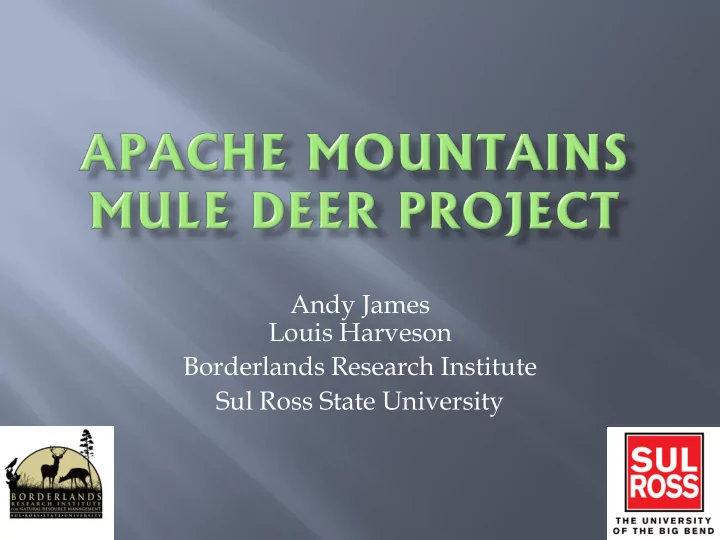

Andy James Louis Harveson Borderlands Research Institute Sul Ross State University
Mule deer are becoming more popular in the state of Texas Very few studies of any type on mule deer in the Trans Pecos
Basic mule deer ecology Annual & seasonal home ranges Effects of supplemental feed on home ranges Determine daily movement patterns Evaluate habitat use Effects of supplemental feed and water on habitat use Better understanding of antler development Aging techniques from teeth wear and replacement and cementum annuli Comparison of deer density, fawn production, & sex ratios between fed and non-fed sites
Annual & Seasonal Home Ranges Effects of supplemental feed on home range and habitat use
Brewster Co. (Lawrence et al. 1994) Male mule deer had home ranges of 4.3 square miles (2,750 ac) Longfellow Ranch – Pecos Co (Wampler 1980) Male mule deer had home ranges of 3.0 square miles (1,920 ac)
Deer were captured annually from 2006- 2010 Animals were aged based on teeth wear Antler measurements taken using Gross B&C method GPS collars were placed around neck Collected data every 5 hours
GPS Collars remained on deer from 1-4 years. Collar data was then entered into ArcGIS for spatial analysis Hawths Tools was used to determine home range size 50% Fixed Kernel (Core Area) 95% Fixed Kernel (Home Range)
An Annual Home Range was determined March 1 – February 28 4 Seasonal Home Ranges were determined Spring (March 1 – May 31) Summer (June 1 – August 31) Fall (September 1 – November 30) Winter (December 1 – February 28) – Includes breeding season
63 Collar Years Approx. 45 miles across Over 300,000 acres 40 Unique Deer 98,492 Total Locations
Ranches Apache Jobe Years 2006 -2010 Seasons Spring, Summer, Winter, Fall Age 4 – 8 years of age
Apache vs. Jobe Annual Mule Deer Home Ranges (95% Kernel) 18,000 16,000 14,000 12,000 Acres 10,000 8,000 6,000 n=6 n=10 n=6 n=4 n=8 n=6 n= 4 n=2 n=10 4,000 2006 2007 2008 2009 2010 Apache 10,708 9,143 7,371 7,190 8,974 Jobe 11,026 9,202 11,249 15,152
Seasonal Home Ranges Of Mature Mule Deer Bucks On The Apache Ranch From 2006-2010 13,000 11,000 9,000 Acres 7,000 5,000 3,000 Spring Summer Fall Winter Annual 2006 7,787 7,347 7,067 8,739 10,708 2007 7,760 6,966 5,213 7,269 9,143 2008 6,238 5,526 4,256 7,641 7,371 2009 4,922 5,372 4,952 8,319 7,190 2010 6,804 5,337 4,577 11,285 8,974
Seasonal Home Ranges Of Mature Mule Deer Bucks On The Jobe Ranch From 2006-2010 20,000 18,000 16,000 14,000 Acres 12,000 10,000 8,000 6,000 4,000 Spring Summer Fall Winter Annual 2006 7,134 7,099 6,232 10,439 11,026 2007 7,550 5,846 6,511 7,446 9,202 2008 8,648 7,496 6,561 11,297 11,249 2009 9,180 6,684 5,984 10,892 15,152
Apache vs Jobe Average Seasonal Home Ranges From 2006-2010 (95% Kernel) 14,000 12,000 10,000 Acres 8,000 6,000 4,000 2,000 Spring Summer Fall Winter Annual Apache 6,839 6,014 5,097 8,970 8,723 Jobe 7,845 6,942 6,350 10,157 11,130
Where each deer spends approximately 50% of his time Based on the density of known locations
Apache vs Jobe Annual Core Area (50% Kernel) 4,000 3,500 3,000 2,500 Acres 2,000 1,500 1,000 500 n=6 n=10 n=6 n=4 n=8 n=6 n=4 n=2 n=10 0 2006 2007 2008 2009 2010 Apache 2,363 1,956 1,332 1,389 1,597 Jobe 2,354 2,028 2,681 2,646
Apache vs. Jobe Average Seasonal Core Area Size From 2006-2010 (50% Kernel) 3000 2500 2000 Acres 1500 1000 n=39 n=23 n=35 n=22 n=34 n=22 n=30 n=21 n= 34 n=22 500 Spring Summer Fall Winter Annual Apache 1487 1330 1139 1727 1709 Jobe 1752 1665 1451 2244 2410
How do home ranges change as deer grow older?
Annual Home Ranges Of Mature Mule Deer Based On Age From 2006-2010 12,000 10,000 8,000 Acres 6,000 4,000 2,000 n=8 n=22 n=20 n=5 n=1 0 4 yrs 5 yrs 6 yrs 7 yrs 8 yrs 95% Kernel 10,244 9,980 9,477 8,686 6,939 50% Kernel 1,903 2,152 1,947 1,599 1,634
Seasonal Home Ranges Of Mature Mule Deer Based On Age 16,000 14,000 12,000 10,000 Acres 8,000 6,000 4,000 2,000 Spring Summer Fall Winter 4 yrs 7,891 6,271 5,367 13,577 5 yrs 7,721 6,566 5,864 8,646 6 yrs 6,755 6,345 5,626 8,868 7 yrs 6,216 5,917 4,688 8,067 8 yrs 7,157 5,746 5,071 5,049
2010 Cumulative Mule Deer Locations In Relation To Water With Feed Sites (Distance in Meters) 80.00% 70.00% 60.00% 50.00% 40.00% 30.00% 20.00% 10.00% 0.00% 50 150 250 350 450 550 650 750 850 950 1050 1150 1250 1350 1450 1550 1650 1750 1850 1950 2050 2150 2250 2350 2450 Mar/Apr/May Jun/Jul/Aug Sept/Oct/Nov Dec/Jan/Feb Random Points
Habitat Use (Ecological Sites, Slope, Aspect) Influence of Ag production Effects of supplemental feed on immigration, emigration, nutrition, & fawn recruitment Movements & dispersal of 1.5 yr – 3.5 yr old deer Fawn survival & recruitment Home ranges on female mule deer Breeding efficiency of mule deer bucks (paternity/genetics) & antler development of bucks (10 yr study across multiple ranches)
Daily Movements 15.9 Miles Over 25 Hours 6.8 Miles Over 5 hours
Management of Mule deer may have to take place on much larger scale than previously thought Supplemental feeders may increase fawn crops and deer densities
Seasonal home ranges vary Largest home range during the winter Smallest home range during the fall Habitat selectivity may be affected by supplemental feed and water Deer appear to spend a significant amount of time near feed and water locations
Apache Ranch Dan Allen & Peggy Hughes Will Hughes George Strickhausen P.J. Fouche Jobe Ranch Stanley Jobe Misty Sumner Lane Sumner Borderlands Research Institute Various Grad Students
Juanita Hughes Foundation Houston Safari Club Nunley Brothers Dallas Safari Club Texas Bighorn Society John Poindexter John T. Saunders Chris Moser Plack Carr San Antonio Livestock Show Wagner Construction Steve C. Lewis Bud Christy Circle Ranch H. M. Palm Dr. Bill Eikenhorst Robert & Tracy Herrin DF Ranch Albert Nance III Brad Everett Steve Dutton Nelson Puett Foundation Coastal Conservation Assoc. Hill Country Safari Club And Many Others
Recommend
More recommend